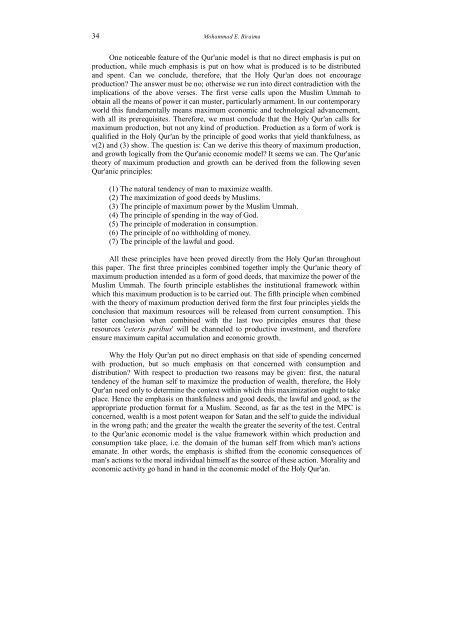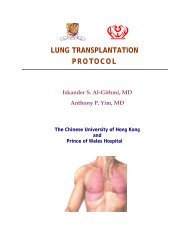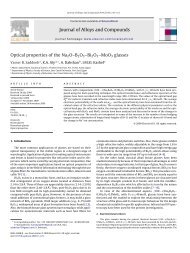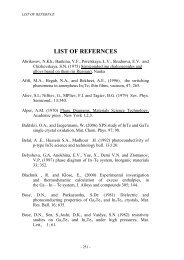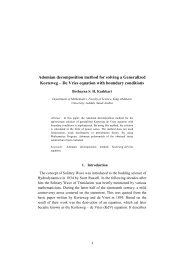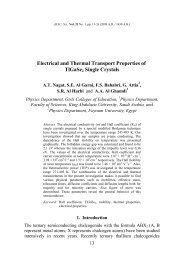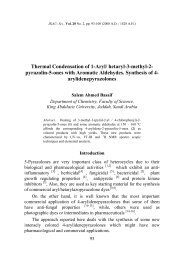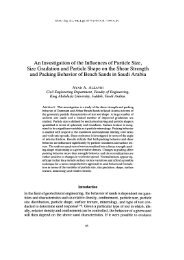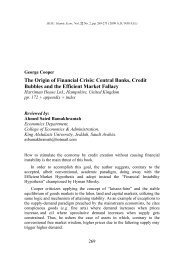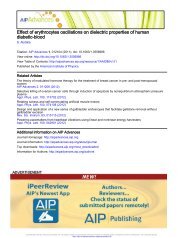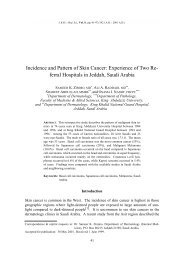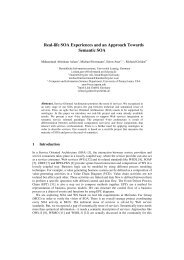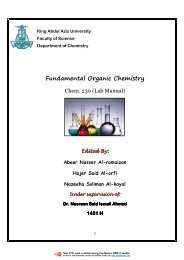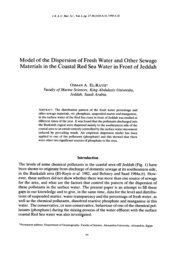A Qur'anic Model for a Universal Economic Theory
A Qur'anic Model for a Universal Economic Theory
A Qur'anic Model for a Universal Economic Theory
You also want an ePaper? Increase the reach of your titles
YUMPU automatically turns print PDFs into web optimized ePapers that Google loves.
34 Mohammad E. Biraima<br />
One noticeable feature of the <strong>Qur'anic</strong> model is that no direct emphasis is put on<br />
production, while much emphasis is put on how what is produced is to be distributed<br />
and spent. Can we conclude, there<strong>for</strong>e, that the Holy Qur'an does not encourage<br />
production? The answer must be no; otherwise we run into direct contradiction with the<br />
implications of the above verses. The first verse calls upon the Muslim Ummah to<br />
obtain all the means of power it can muster, particularly armament. In our contemporary<br />
world this fundamentally means maximum economic and technological advancement,<br />
with all its prerequisites. There<strong>for</strong>e, we must conclude that the Holy Qur'an calls <strong>for</strong><br />
maximum production, but not any kind of production. Production as a <strong>for</strong>m of work is<br />
qualified in the Holy Qur'an by the principle of good works that yield thankfulness, as<br />
v(2) and (3) show. The question is: Can we derive this theory of maximum production,<br />
and growth logically from the <strong>Qur'anic</strong> economic model? It seems we can. The <strong>Qur'anic</strong><br />
theory of maximum production and growth can be derived from the following seven<br />
<strong>Qur'anic</strong> principles:<br />
(1) The natural tendency of man to maximize wealth.<br />
(2) The maximization of good deeds by Muslims.<br />
(3) The principle of maximum power by the Muslim Ummah.<br />
(4) The principle of spending in the way of God.<br />
(5) The principle of moderation in consumption.<br />
(6) The principle of no withholding of money.<br />
(7) The principle of the lawful and good.<br />
All these principles have been proved directly from the Holy Qur'an throughout<br />
this paper. The first three principles combined together imply the <strong>Qur'anic</strong> theory of<br />
maximum production intended as a <strong>for</strong>m of good deeds, that maximize the power of the<br />
Muslim Ummah. The fourth principle establishes the institutional framework within<br />
which this maximum production is to be carried out. The fifth principle when combined<br />
with the theory of maximum production derived <strong>for</strong>m the first four principles yields the<br />
conclusion that maximum resources will be released from current consumption. This<br />
latter conclusion when combined with the last two principles ensures that these<br />
resources 'ceteris paribus' will be channeled to productive investment, and there<strong>for</strong>e<br />
ensure maximum capital accumulation and economic growth.<br />
Why the Holy Qur'an put no direct emphasis on that side of spending concerned<br />
with production, but so much emphasis on that concerned with consumption and<br />
distribution? With respect to production two reasons may be given: first, the natural<br />
tendency of the human self to maximize the production of wealth, there<strong>for</strong>e, the Holy<br />
Qur'an need only to determine the context within which this maximization ought to take<br />
place. Hence the emphasis on thankfulness and good deeds, the lawful and good, as the<br />
appropriate production <strong>for</strong>mat <strong>for</strong> a Muslim. Second, as far as the test in the MPC is<br />
concerned, wealth is a most potent weapon <strong>for</strong> Satan and the self to guide the individual<br />
in the wrong path; and the greater the wealth the greater the severity of the test. Central<br />
to the <strong>Qur'anic</strong> economic model is the value framework within which production and<br />
consumption take place, i.e. the domain of the human self from which man's actions<br />
emanate. In other words, the emphasis is shifted from the economic consequences of<br />
man's actions to the moral individual himself as the source of these action. Morality and<br />
economic activity go hand in hand in the economic model of the Holy Qur'an.


